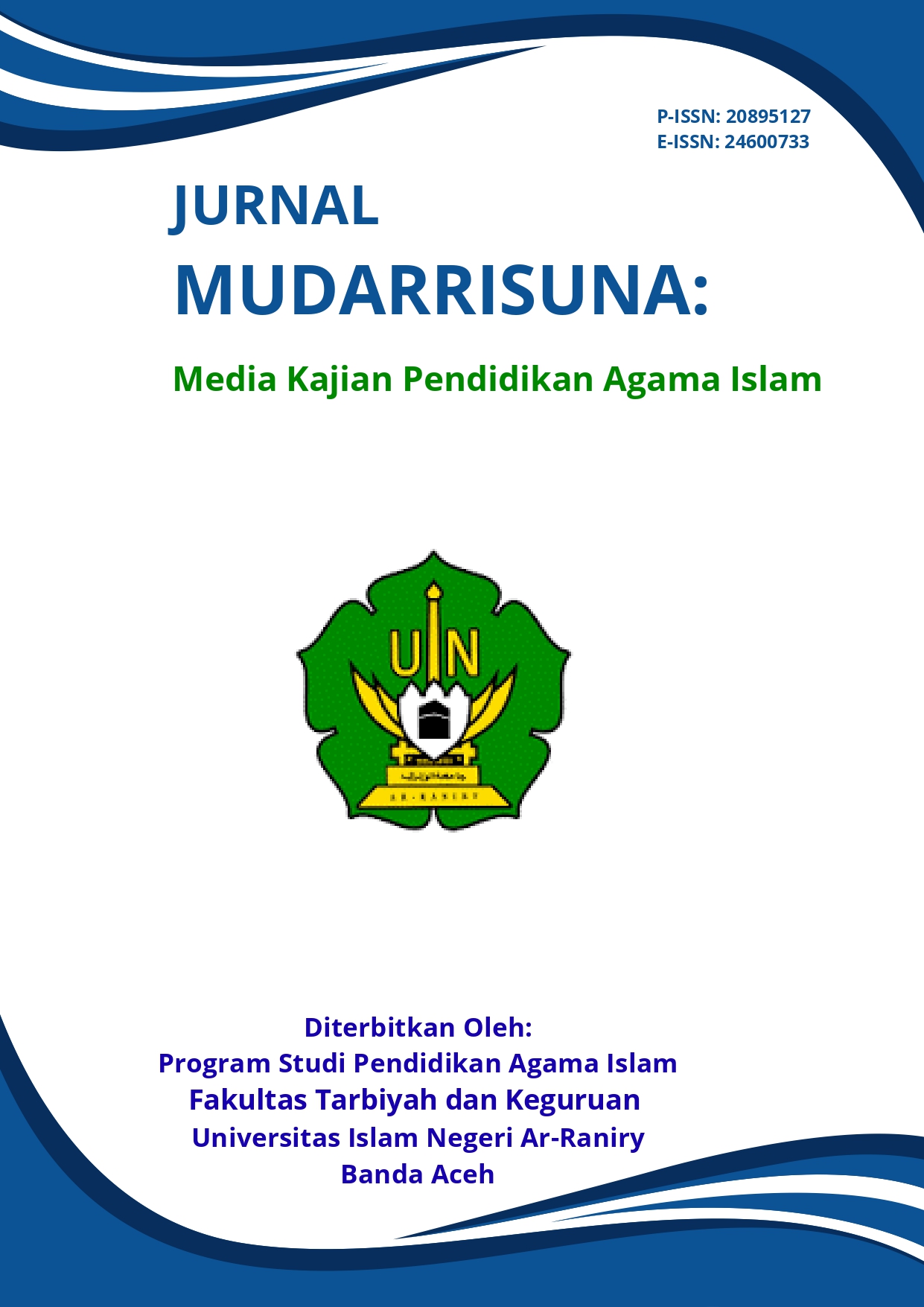PENGARUH PENGGUNAAN METODE PEMBELAJARAN ROLE PLAYING TERHADAP PENINGKATAN HASIL BELAJAR PAI SISWA SMP NEGERI 2 TAPAKTUAN ACEH SELATAN
DOI:
https://doi.org/10.22373/td6f3245Keywords:
Role Playing Method, Learning Outcomes, Islamic Religious Education, Active LearningAbstract
Quality education is highly dependent on the teaching strategies used by teachers to improve student learning outcomes. Role-playing is one approach to increase student engagement in learning. The purpose of this study was to see how the role-playing method affects student learning outcomes in Islamic religious education subjects at SMP Negeri 2 Tapaktuan, South Aceh. This study used quantitative techniques using a pre-test, post-test, control experimental design. This study involved two groups: the experimental group used the role-playing method, and the control group used the usual method. To assess student understanding, the research instrument was a written test with multiple choices and fill-in-the-blank questions. Data collection strategies included giving pre-tests and post-tests to both groups before and after the learning process. The data obtained were analyzed using a t-test for two independent samples. The results showed a significant difference between the experimental group and the control group. The average post-test score of the experimental group was 80.30, while the control group was 72.3, with a t value (2.59) greater than the t table (2.02), indicating that the role-playing approach was more effective in improving student learning outcomes compared to the lecture method. Thus, this study reveals that the use of role-playing strategies can improve students' learning outcomes, especially in terms of social skills and problem solving.
Keywords: Role Playing Method, Learning Outcomes, Islamic Religious Education, Active Learning
References
Acharya, H., Reddy, R., Hussein, A., Bagga, J., & Pettit, T. (2019). The effectiveness of applied learning: an empirical evaluation using role playing in the classroom. Journal of Research in Innovative Teaching and Learning, 12(3), 295–310. https://doi.org/10.1108/JRIT-06-2018-0013
Al-adwan, S. H. (2024). The Effectiveness of Using Role Play Strategy in Teaching History for Sixth- The Effectiveness of Using Role Play Strategy in Teaching History for Sixth-Grade Students. October.
Creswell, J. W. (1994). Research Design: Qualitative and Quantitative Approaches. California: Sage Publications, Inc.
Elouali, F. zohra. (2023). Incorporating role-play as an innovative approach to fostering English Foreign Language students’ creativity and critical thinking. Global Journal of Foreign Language Teaching, 13(2), 142–155. https://doi.org/10.18844/gjflt.v13i2.8718
Fasco, P. S., Asiimwe, S., Ssekabira, G., & Tushabe, J. A. (2024). Enhancing student engagement and learning outcomes: Effective strategies in institutional pedagogy. International Journal of Multidisciplinary Research and Growth Evaluation, 05(04), 758–767. www.allmultidisciplinaryjournal.com
Fitri, L. H. (2024). Improving Student Learning Outcomes with the Drill Method in PAI Subjects at SDN 04 Bukit Malintang Elementary School. Bukittinggi International Conference on Education (BICED) Proceeding, 1(1), 339–405.
Krebt, D. M. (2017). The effectiveness of role play techniques in teaching speaking for efl college students. Journal of Language Teaching and Research, 8(5), 863–870. https://doi.org/10.17507/jltr.0805.04
Mariskhana, K. (2019). Prestasi Belajar Sebagai Dampak Dari Minat Baca Dan Bimbingan Belajar Siswa IPS. Cakrawala. Cakrawala, 19(1), 71–78.
Maslow, A. H. (1943). A Theory of Human Motivation. Psychological Review, 50(4), 370–396.
Piaget, J. (1972). The Principles of Genetic Epistemology. Routledge & Kegan Paul.
Putri, D. D., Susanti, R. H., Herlinda, H., & Aramudin, A. (2024). Enhancing Student Learning Engagement through Role-Play Method in 5th Grade Indonesian Language Primary Classroom. Journal of Learning Improvement and Lesson Study, 3(2), 14–21. https://doi.org/10.24036/jlils.v3i2.57
Saptono, L., Soetjipto, B. E., Wahjoedi, & Wahyono, H. (2020). Role-playing model: Is it effective to improve students’ accounting learning motivation and learning achievements? Cakrawala Pendidikan, 39(1), 133–143. https://doi.org/10.21831/cp.v39i1.24781
Slavin, R. (2012). Educational Psychology (Theori and Practice) Tenth Edition. Pearson.
Sosa, M. J., & Narciso, D. (2019). The impact of the flipped classroom in higher education: A case study. Aloma, 37(2), 15–23. https://doi.org/10.51698/aloma.2019.37.2.15-23
Subaryana. (2015). Konsep Diri Dan Prestasi Belajar. Program Studi Pendidikan Bahasa Dan Sastra Indonesia Fakultas Bahasa Dan Seni , 7(2), 1–10.
Sugiyono. (2019). Metode Penelitian dan Pengembangan (Research and Development). Cet. IV, Bandung: Alfabeta.
Varveris, D., Tsiantos, V., & Saltas, V. (2022). Measuring Behavioral Evaluation Performance Using Neural Network and Regression Analysis. European Journal of Education and Pedagogy, 3(6), 62–67. https://doi.org/10.24018/ejedu.2022.3.6.498
Vygotsky, L. (1981). The development of higher forms of attention in childhood. In J. V. Wertsch (Ed.), The concept of activity in Soviet psychology. http://infopublik.wordpress.com/2008/12/13/pelayanan-satu-pintu-
Yusnarti, M., & Suryaningsih, L. (2021). Pengaruh Model Pembelajaran Role Playing Terhadap Hasil Belajar Siswa Sekolah Dasar. Ainara Journal (Jurnal Penelitian Dan PKM Bidang Ilmu Pendidikan), 2(3), 253–261. https://doi.org/10.54371/ainj.v2i3.89
Downloads
Published
Issue
Section
License
Copyright (c) 2025 Maidar Maidar

This work is licensed under a Creative Commons Attribution-ShareAlike 4.0 International License.
Jurnal MUDARRISUNA: Media Kajian Pendidikan Agama Islam allows the author(s) to hold the copyright and to retain the publishing rights without restrictions. Authors who publish in this journal agree to the following terms:
- Authors retain copyright and grant the journal right of first publication with the work simultaneously licensed under a Creative Commons Attribution-ShareAlike 4.0 International License that allows others to share the work with an acknowledgment of the work's authorship and initial publication in this journal.
- Authors are able to enter into separate, additional contractual arrangements for the non-exclusive distribution of the journal's published version of the work (e.g., post it to an institutional repository or publish it in a book), with an acknowledgment of its initial publication in this journal.
- Authors are permitted and encouraged to post their work online (e.g., in institutional repositories or on their website) prior to and during the submission process, as it can lead to productive exchanges, as well as earlier and greater citation of published work.




